NIH Award Funds Data Coordinating Center for Down Syndrome Research
November 9th, 2020 by Global Down Syndrome Foundation
The new initiative will fuel collaboration and discovery about the biology of Down syndrome and its co-occurring medical conditions
Press Contacts:
Amanda Hilll Linda Crnic Institute for Down Syndrome | amanda.a.hill@cuanschutz.edu | C: 303.724.9907
Bobby Moulder Center for Data Driven Discovery in Biomedicine | moulderr@email.chop.edu | C: 484.258.8539
Hsiao-Ching Chou Sage Bionetworks | chou@sagebionetworks.org | C: 206.696.3663
DENVER, CO November 5, 2020 Scientists and data experts are joining forces to create the world’s first centralized platform for Down syndrome researchers to share, access, and analyze data. The goal of the new initiative, called the “Data Management and Portal for INCLUDE (DAPI) Project,” is to accelerate discoveries and advance medical care for individuals with Down syndrome. The National Institutes of Health (NIH) recently awarded a grant totaling $19.5M over five years to develop the center as part of the INCLUDE Project (INvestigation of Co-occurring conditions across the Lifespan to Understand Down syndromE).
The DAPI Project is co-led by Dr. Adam Resnick, Director of the Center for Data Driven Discovery for Biomedicine (D3b) at Children’s Hospital of Philadelphia, Dr. Joaquin Espinosa, Executive Director of the Linda Crnic Institute for Down Syndrome at the University of Colorado Anschutz Medical Campus, and Dr. Justin Guinney, Vice President of Computational Oncology at Sage Bionetworks. DAPI Project leaders will work closely with NIH INCLUDE Project staff to develop the center. This collaboration brings together strong expertise in Down syndrome research and open, data-driven science.
“We expect this new data center will be an impactful resource for the INCLUDE Project and the larger Down syndrome research community,” said Dr. Charlene Schramm, NIH Program Officer for the award. “The goal is to create a world-class portal for data sharing and analysis that will encourage innovative investigations into Down syndrome comorbidities across the lifespan.”
Dr. Melissa Parisi, one of the leaders of the NIH INCLUDE Project, added “The DAPI Project will combine data from existing research cohorts of individuals with Down syndrome with new cohorts. By building common data and shared analytic platforms, this project hopes to create a rich resource to help advance our understanding of these co-occurring conditions and support future therapeutic development.”
The INCLUDE Project is a trans-NIH initiative launched in 2018 to support research into conditions that affect individuals with Down syndrome and the general population. More than six million individuals living with Down syndrome have an increased risk of developing a wide range of medical conditions, such as certain autoimmune disorders and Alzheimer’s disease. At the same time, they are protected from some of the largest killers of the general population, including solid cancers and certain heart disease. Therefore, a key goal of the INCLUDE Project is to decode the underlying biology that alters these and many other co-occurring medical conditions in individuals with Down syndrome.
“Coordinated discovery efforts in this population not only have the potential to directly improve the lives of individuals with Down syndrome, but also to impact millions of other people affected by numerous related and co-occurring conditions,” said Dr. Espinosa of the Crnic Institute.
To enable these investigations, the mission of the DAPI Project is to create a world class platform for data sharing, data access, and integrative analysis in Down syndrome. The platform will empower scientists, physicians, and the community with tools to elicit evidence-based action in the laboratory, clinic, classroom, government, and society at-large.
“More and more, the scientific community is demonstrating the power of platforms to connect different communities with diverse areas of expertise and datasets to drive surprising discoveries and accelerated impact across a broad number of conditions in both children and adults,” said Dr. Resnick of D3b. “The DAPI Project will build on these efforts through the implementation of new technologies and platforms that will empower large-scale, diverse INCLUDE datasets on behalf of individuals with Down syndrome and other associated medical conditions and diseases.”
The DAPI Project is organized into three cores, roughly centered at each of the three partner organizations:
- Data Portal Core.Led by Dr. Resnick at D3b, the Data Portal Core oversees the development of the web-based data portal, which will be the public-facing centralized platform for data sharing and analysis. Dr. Resnick and the team at D3b are recognized leaders in collaborative, data-driven science, with expertise in pediatric cancers and diseases and large-scale data visualization and analysis.
- Data Management Core. Led by Dr. Guinney at Sage Bionetworks, the Data Management Core directs the overall data management practices for the DAPI Project, including protocols for data collection, governance, harmonization, processing, and sharing. Sage Bionetworks is a non-profit biomedical research organization devoted to responsible, open data-sharing practices, with broad expertise in computational and systems biology, as well as neurodegenerative diseases.
- Administrative and Outreach Core.Led by Dr. Espinosa at the Crnic Institute, the Administrative and Outreach Core leads outreach, education, and stakeholder engagement efforts for the scientific and Down syndrome communities, as well as overall project management. Dr. Espinosa and the Crnic Institute team are leading Down syndrome researchers who also administer a large Down syndrome research program at the University of Colorado.
Additional experts from Centre Hospitalier Universitaire Sainte-Justine, Oregon Health and Science University, Oregon State University, Seven Bridges Genomics, and Vanderbilt University Medical Center will also collaborate with the DAPI Project team.
“We have created a truly exceptional team with diverse expertise to accomplish the mission of the DAPI Project,” said Dr. Guinney of Sage Bionetworks. “We are all excited and honored to work with the NIH, the Down syndrome research community, and each other on this new endeavor.”
DAPI Project operations began in early October, including efforts to identify existing Down syndrome cohorts and data already established by researchers, to engage in ‘listening tours’ to understand the needs of the researcher and Down syndrome communities, and to develop frameworks for data governance, standardization, and management. The DAPI Project team aims to release the first version of the public data portal in 2022, while continuing to refine and expand the platform thereafter.
About the Center for Data Driven Discovery in Biomedicine (D3b)
The Center for Data Driven Discovery in Biomedicine (D3b) is a translational biomedical research Center of Emphasis at the Children’s Hospital of Philadelphia Research Institute. D3b’s multi-disciplinary expertise is accelerating bench-to-bedside research on behalf of children diagnosed with cancer and other rare conditions. D3b’s seven collaborative units bring together experts in oncology and basic research, genomics, data science, bioinformatics, neurosurgery, and other research-related disciplines to discover breakthroughs for every child, every time, everywhere. To learn more about the D3b Center, visit https://d3b.center/.
About the Linda Crnic Institute for Down Syndrome
The Linda Crnic Institute for Down Syndrome is the first academic research center fully devoted to improving the lives of people with Down syndrome through advanced biomedical research, spanning from basic science to translational and clinical investigations. Founded through the generous support and partnership of the Global Down Syndrome Foundation, the Anna and John J. Sie Foundation, and the University of Colorado, the Crnic Institute administers a thriving Down syndrome research program involving over 50 research teams across four campuses on the Colorado Front Range. To learn more, visit www.crnicinstitute.org or follow us on Facebook and Twitter @CrnicInstitute.
About Sage Bionetworks
Sage Bionetworks is a nonprofit biomedical research and technology development organization that was founded in Seattle in 2009. Our focus is to develop and apply open practices to data-driven research for the advancement of human health. Our interdisciplinary team of scientists and engineers work together to provide
researchers access to technology tools and scientific approaches to share data, benchmark methods, and explore collective insights, all backed by Sage’s gold-standard governance protocols and commitment to user- centered design. Sage is a 501c3 and is supported through a portfolio of competitive research grants, commercial partnerships, and philanthropic contributions. To learn more, visit https://sagebionetworks.org.
About Global Down Syndrome Foundation
The Global Down Syndrome Foundation (GLOBAL) is the largest non-profit in the U.S. working to save lives and dramatically improve health outcomes for people with Down syndrome. GLOBAL has donated more than $32 million to establish the first Down syndrome research institute supporting over 400 scientists and over 2,000 patients with Down syndrome from 28 states and 10 countries. Working closely with Congress and the National Institutes of Health, GLOBAL is the lead advocacy organization in the U.S. for Down syndrome research and care. GLOBAL has a membership of over 100 Down syndrome organizations worldwide, and is part of a network of Affiliates – the Crnic Institute for Down Syndrome, the Sie Center for Down Syndrome, and the University of Colorado Alzheimer’s and Cognition Center – all on the Anschutz Medical Campus.
GLOBAL’s widely-circulated medical publications include GLOBAL Medical Care Guidelines for Adults with Down Syndrome, Prenatal Testing and Information about Down Syndrome, and the award-winning magazine Down Syndrome WorldTM. GLOBAL also organizes the Be Beautiful Be Yourself Fashion Show, the largest Down syndrome fundraiser in the world. Visit globaldownsyndrome.org and follow us on social media (facebook & twitter:@GDSFoundation)(instagram:@globaldownsyndrome).
Down Syndrome Research Could Provide Important Insights Into Cancer Treatments
March 8th, 2019 by Global Down Syndrome Foundation
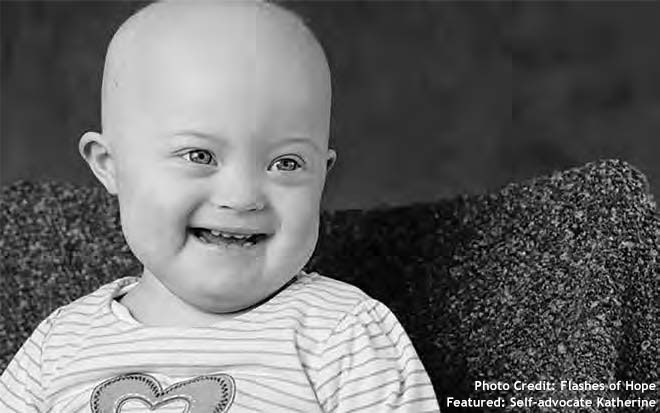
From Down Syndrome World Issue 4 2018
People with Down syndrome are highly protected from most solid tumor cancers, and yet they are highly predisposed to certain blood cancers. Studying people with Down syndrome may lead to new cancer treatments that could benefit everyone.
ACCORDING TO THE AMERICAN CANCER SOCIETY, an estimated 1,762,450 new cases of cancer will be diagnosed in 2019. There are hundreds of types of cancers and different ways to categorize them. One way to categorize cancer is into two types — solid tumor cancers and blood, or hematological, cancers.
People with Down syndrome are highly protected from most solid tumor cancers, such as breast, uterine, and prostate cancers. However, people with Down syndrome are much more likely to develop certain leukemias, one of the key blood cancers found predominantly in children.
IN SEARCH OF ANSWERS
World-renowned cancer researcher Joaquín Espinosa, Ph.D., Executive Director of the Linda Crnic Institute for Down Syndrome, has studied cancer biology for years. He was an early career scientist of the Howard Hughes Medical Institute before a grant from the Global Down Syndrome Foundation opened his eyes to the broad implications of investigating the connection between cancer and Down syndrome.
“My mentor, Tom Blumenthal, was the director of the Crnic Institute and insisted I apply for a grant,” says Dr. Espinosa. “I had no idea that the science would be so fascinating and that I would come to feel that people with Down syndrome are like my extended family.”
Three years later, Dr. Espinosa and his team discovered that the extra copy of chromosome 21 in people with Down syndrome triggers an immune system process called the interferon response, which may have a significant bearing on cancer risk.
“From birth, the immune system of people with Down syndrome is very dysregulated,” Dr. Espinosa says. “It’s out of balance, so aspects of it are hyperactive and others are weakened. The hyperactivity may explain why solid tumor cancers are not allowed to grow and, therefore, why it is rare for people with Down syndrome to get most solid tumor cancers. Conversely, it may also explain why autoimmune disorders are so prevalent.”
Other researchers hypothesize that chromosome 21 contains one or more tumor-suppressing genes, which may explain why having an extra copy of the chromosome protects against solid tumors, and that the chromosome also contains genes that spur the development of leukemias.
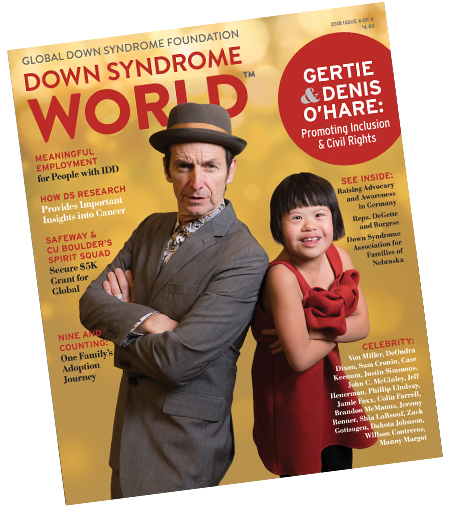 This article was published in the award-winning Down Syndrome World™ magazine. Become a member to read all the articles and get future issues delivered to your door!
This article was published in the award-winning Down Syndrome World™ magazine. Become a member to read all the articles and get future issues delivered to your door!
LUKEMIA: AN EARLY CHILDHOOD RISK
Children with Down syndrome are particularly susceptible to two types of leukemia: acute megakaryoblastic leukemia (AMKL) and B-cell acute lymphoblastic leukemia (B ALL), the most common subtype of acute lymphoblastic leukemia (ALL).
They are also uniquely susceptible to one bone marrow disorder that results in a higher risk of AMKL called transient myeloproliferative disorder (TMD). TMD, also called transient leukemia, is found only in newborns with Down syndrome. As many as 30 percent of babies with Down syndrome are born with TMD, and although it can cause severe or life-threatening problems, the overwhelming majority of cases resolve naturally by the third month of life.
However, infants with TMD are at increased risk of developing acute myeloid leukemia (AML), which can strike children all the way through the teenage years. In particular, children with Down syndrome between ages 1 and 5 are 150 times more likely than typical children to develop AMKL, a rare type of AML. AMKL is a life threatening leukemia in which malignant megakaryoblasts proliferate abnormally and injure various tissues.
While the risk for AMKL is consider ably higher, many studies report better outcomes for patients with Down syndrome compared with their typical counterparts. Children with Down syndrome who develop AMKL have a roughly 80 percent five year event-free survival rate, which is substantially better than that seen in typical children with this leukemia, according toJohn Crispino, Ph.D., Robert I. Lurie, M.D. and Lora S. Lurie Professor of Medicine at Northwestern University.
“Nevertheless, not all children with Down syndrome survive the disease, and survival rates for those who relapse even after a bone marrow transplant are abysmal,” Dr. Crispino says.
Dr. Crispino’s lab has several areas of focus including acute leukemias and myeloproliferative neoplasms, and he is considered one of the leading authorities regarding leukemia in patients with Down syndrome.
According to Dr. Crispino, there is a 20-fold increased risk of B-ALL in children and young adults with Down syndrome primarily from ages 5 to 20. B-ALL is an aggressive type of leukemia in which too many B-cell lymphoblasts are found in the bone marrow and blood.
Unlike AMKL, reports and studies show that patients with Down syndrome with B-ALL fair worse than their typical counterparts — they have a higher relapse rate, may suffer severe side effects from chemotherapy, and have higher treatment-related mortality.
According to Dr. Crispino, part of the problem could be attributed to the attending physicians’ lack of adherence to the different chemotherapy protocols for pediatric patients with Down syndrome. Patients with Down syndrome often react poorly to standard chemotherapy for B-ALL, and their “toxicity profile” means more side effects that can result in extreme loss of red and white blood cells and platelets, inflammation in the digestive tract, and even heart failure.
“These patients need modified treatment protocols and universal supportive care guidelines that are optimal,” says Dr. Crispino. “Including patients with Down syndrome in studies of novel agents, such as immunotherapy and JAK inhibitors, could also help address this problem.”
Global’s lobbying and advocacy effor ts, resulting in a $24 million increase in Down syndrome research at the National Institutes of Health (NIH) in 2018, certainly led to an increase in cancer research in this special population, but there is still a long w ay to go. Dr. Crispino believes we desperately need less toxic and more effective therapies, especially to prevent relapse and treatment related mortality in patients with Down syndrome. He advocates for research at the NIH that would determine why Down syndrome leads to the increased incidence of leukemia and identify novel drug targets that will lead to development of safer treatments, and for leveraging new technologies that will identify specific genes on chromosome 21 linked to leukemia.
While leukemia does not always cause symptoms, Karen Rabin, M.D., Ph.D., Associate Professor of Pediatric Hematology/Oncology and Director of the Leukemia Program at Texas Children’s Cancer Center and Baylor College of Medicine, says parents should look out for bone pain, difficult y walking, easy bruising or bleeding, pallor, prolonged and unexplained fevers, and swollen glands in the neck and elsewhere.
A complete blood count can detect leukemia in some cases but is not recommended unless symptoms are present, according to Dr. Rabin. Chemotherapy is the standard treatment for most acute leukemia. But immunotherapy — a class of therapies that train the immune system to target cancer — is an emerging option.
“Immunotherapy is not generally used for newly diagnosed ALL at this time, but it is a very effective treatment in cases of relapse,” Dr. Rabin explains. “I particularly recommend early consideration of immunotherapy for relapsed ALL in children with Down syndrome because they are at high risk of serious complications when treated with standard relapse chemotherapy regimens.”
RESEARCH THAT BENEFITS EVERYONE
Of the 1.7 million new cancer cases estimated to be diagnosed in the United States in 2019, it is impossible to know how many of those cancers will occur in people with Down syndrome, according to Dr. Espinosa. Regardless, studying cancer in this population benefits anyone who develops the disease. Dr. Rabin agrees.
“We first discovered a major class of genetic alterations in ALL by studying ALL samples from children with Down syndrome, where the alterations are much more common than in other ALL cases,” she says. “This has led to a clinical trial of ruxolitinib, an inhibitor targeting this pathway, as a new treatment for ALL.”
Dr. Espinosa and his team at the Crnic Institute, with financial support from Global’s Mary Miller & Charlotte Fonfara-LaRose Down Syndrome & Leukemia Research Fund, are testing the effectiveness of drugs that inhibit two genetic mutations that cause runaway cellular growth linked to leukemia. Dr. Crispino and his team have conducted preclinical studies of inhibitors of a particular gene on chromosome 21 that may be active both in individuals with Down syndrome who have B-ALL and in some typical individuals with that type of leukemia.
“With respect to solid tumors, research into why people with Down syndrome develop cancer at low rates has enormous potential to shed light on chemoprevention strategies,” Dr. Crispino states. “If we can discover the genes on chromosome 21 that protect against solid tumors, we may be able to leverage these insights to develop drugs to halt cancer initiation or progression in all people.”
Like this article? Join Global Down Syndrome Foundation’s Membership program today to receive 4 issues of the quarterly award-winning publication, plus access to 4 seasonal educational Webinar Series, and eligibility to apply for Global’s Employment and Educational Grants.
Register today at downsyndromeworld.org!
The Importance of Immune System Dysregulation in People with Down Syndrome
November 8th, 2018 by Global Down Syndrome Foundation
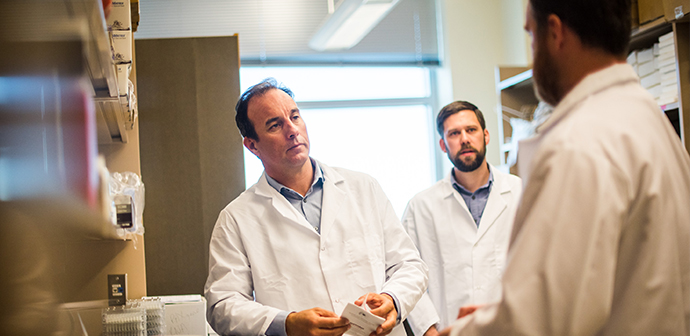
From Down Syndrome World Issue 3 2018
How does an extra copy of chromosome 21 drive the developmental and clinical features of Down syndrome? This question has been the subject of many investigations since 1958, when Jérôme Lejeune reported the Presence of trisomy 21 in cells of people with Down syndrome. The answer has remained elusive.
NOW, RESEARCH FROM the Linda Crnic Institute for Down Syndrome points to dysregulation of the immune system as a mechanism by which the extra chromosome would cause this multiorgan, multi-system condition. The implications of these results are profound, because they not only provide a new conceptual framework for future research, but also illuminate avenues for the development of novel diagnostic and therapeutic opportunities to improve health outcomes in Down syndrome. Of the more than 20,000 genes encoded in the human genome, chromosome 21 carries fewer than 300, the lowest number of genes on any human chromosome. While consensus among scientists is that Down syndrome is a “polygenic condition,” a condition caused by increased activity of more than one gene, it is also agreed that not all genes on chromosome 21 would contribute equally to the condition. If one were to select a random group of 300 genes, it is recognized that only a few genes would be master regulators of cellular and organismal function. What then are the master regulator genes on chromosome 21 with the greatest impact on human biology? To address this question, scientists at the Crnic Institute employed an approach known as functional genomics, which involves measurements of the activity of thousands of genes across the entire genome, to identify the gene networks most impacted by trisomy 21.
OVERACTIVE IMMUNE SYSTEMS?
The first set of results from the analysis of cells of people with Down syndrome (Sullivan et al., 2016) revealed that trisomy 21 causes constitutive activation of the gene network known as the Interferon response, a key branch of the immune system responsible for fighting off viral infections. In cells from typical people, the Interferon response was dormant, but cells from people with Down syndrome seemed to be fighting off a viral infection that just wasn’t there. These results immediately drove attention to four genes on chromosome 21 known as the Interferon receptors, which are required for cells and tissues to respond to a viral infection and whose triplication could potentially trigger constant activation of this arm of the immune system.
The second set of results from the analysis of blood samples (Sullivan et al., 2017) revealed signs of chronic autoinflammation in people with Down syndrome. Measurements of approximately 4,000 different proteins in the blood identified about 300 that are differentially abundant between people with and without Down syndrome, with about half of those 300 proteins being involved in the immune system. Importantly, this study revealed signs of both constant activation and exhaustion of different aspects of the immune system, with obvious ties to the Interferon response. It is well established that the Interferon response enhances anti-viral defenses, but too much Interferon activity eventually weakens antibacterial defenses. Indeed, the results of the blood analysis were consistent with a type of immune dysregulation caused by lifelong hyperactivation of the Interferon response.
Noteworthy, both studies revealed, among people with Down syndrome, strong inter-individual variation in the degree of activation of the Interferon response and autoinflammation, which could potentially be linked to the obvious clinical diversity in this population.
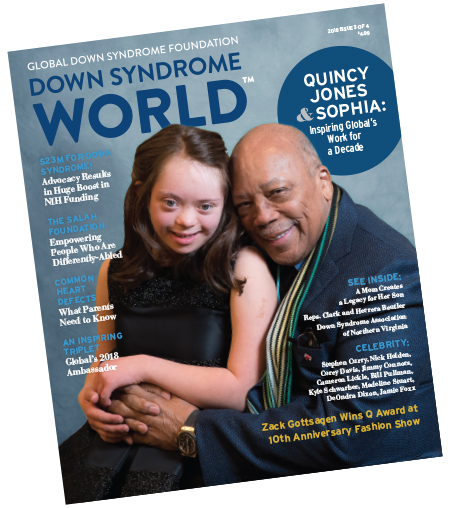 This article was published in the award-winning Down Syndrome World™ magazine. Become a member to read all the articles and get future issues delivered to your door!
This article was published in the award-winning Down Syndrome World™ magazine. Become a member to read all the articles and get future issues delivered to your door!GREATER INSIGHTS AND POTENTIAL TREATMENTS
These results have triggered a flurry of activity at the Crnic Institute to answer key follow-up questions: Which of the symptoms of Down syndrome could be explained by the observed immune dysregulation? To what degree is the immune dysregulation caused by triplication of the four Interferon receptors versus other genes on chromosome 21? What would be the diagnostic value of measuring immune dysregulation to predict the risk of the same person developing certain co-occurring diseases or conditions? What would be the therapeutic value of medications that inhibit the Interferon response and accompanying inflammatory process?
Several key facts are generating much enthusiasm in the pursuit of these answers. First, it is well established that a hyperactive Interferon response has negative effects on human development, as illustrated by type I Interferonopathies, a newly recognized class of genetic conditions caused by gene mutations that lead to activation of the Interferon response and share many symptoms with Down syndrome. Second, the pharmaceutical industry has developed many medications that inhibit the Interferon response, some of which are approved for the treatment of autoinflammatory conditions, such as rheumatoid arthritis, and are currently being tested for the treatment of autoimmune conditions more prevalent in Down syndrome, such as alopecia areata and vitiligo. Third, pioneer studies in mouse models of Down syndrome completed by Lenny Maroun, Ph.D., currently at the Crnic Institute, demonstrated that reducing the Interferon response improves the development of these mice (Maroun et al., 2000).
Altogether, this body of research justifies a strong investment in the study of the immune system in Down syndrome, with the obvious potential to develop diagnostic and therapeutic strategies to improve the well-being of those living with trisomy 21.
To learn more about research at the Crnic Institute, visit globaldownsyndrome.org/our-story/linda-crnic-institute.
References:
Maroun, L.E., Heffernan, T.N., and Hallam, D.M. Partial IFN-alpha/ beta and IFN-gamma receptor knockout trisomy 16 mouse fetuses show improved growth and cultured neuron viability. Journal of Interferon & Cytokine Research: the Official Journal of the International Society for Interferon and Cytokine Research. 2000; 20, 197–203.
Sullivan, K.D., Evans, D., Pandey, A., Hraha, T.H., Smith, K.P., Markham, N., Rachubinski, A.L., Wolter-Warmerdam, K., Hickey, F., Espinosa, J.M., et al. Trisomy 21 causes changes in the circulating proteome indicative of chronic autoinflammation. Scientific Reports. 2017; 7, 14,818.
Sullivan, K.D., Lewis, H.C., Hill, A.A., Pandey, A., Jackson, L.P., Cabral, J.M., Smith, K.P., Liggett, L.A., Gomez, E.B., Galbraith, M.D., et al. Trisomy 21 consistently activates the interferon response. 2016; eLife. 5.
Like this article? Join Global Down Syndrome Foundation’s Membership program today to receive 4 issues of the quarterly award-winning publication, plus access to 4 seasonal educational Webinar Series, and eligibility to apply for Global’s Employment and Educational Grants.
Register today at downsyndromeworld.org!
$2.9 Million For Down Syndrome & Alzheimer’s Research
October 31st, 2018 by Global Down Syndrome Foundation
Crnic Institute’s supergroup scientists received a $2.9 million grant from the National Institute of Neurological Disorders and Stroke (NINDS) at the National Institutes of Health (NIH) for their important research on beta-amyloid, the protein encoded on chromosome 21 that causes Alzheimer’s disease.
Because individuals with Down syndrome carry an extra copy of the gene that encodes the beta-amyloid, nearly every person with Down syndrome will develop the brain pathology of Alzheimer’s disease at a relatively young age. However, there are major gaps in the understanding of how beta-amyloid disrupts neuron function in Down syndrome and Alzheimer’s disease.
This team hopes to reveal how beta-amyloid causes the loss of connections between neurons so that new therapeutic strategies to block the neurotoxic activities of beta-amyloid can be developed.
Meet Our Scientists |
|
|
|
|
|
|
|
|
What’s New? Your Science Recap from the 2018 Linda Crnic Institute Down Syndrome Symposium
October 11th, 2018 by Global Down Syndrome Foundation

On September 26, 2018, 200 scientists met to discuss their newest important research on trisomy 21 at the Crnic Institute for Down Syndrome’s 8th Annual Down Syndrome Symposium.
Below, find a short, simple breakdown of the latest Down syndrome research. (And you don’t have to be a scientist to get it!) Click on the scientist’s bio for more detailed information on their work.
Your Science Recap: |
|
|
|
|
|
|
|
|
|
|
|
|
|
|
|
|
|
|
To learn more about the work the scientists at the Crnic Institute are doing, visit here.
To participate in the Crnic Institute’s Human Trisome Project, visit here.
Crnic Institute Scientists Receive NIH and Lejeune Grants
July 26th, 2018 by Global Down Syndrome Foundation
We proudly support the important research of two of our Crnic Institute scientists, Katheleen Gardiner, Ph.D. and Michael Yeager, Ph.D. Dr. Gardiner received a R03 NIH grant to understand cognitive deficits in Down syndrome from Hsa21 orthologs on mouse chromosome 10 and Dr. Yeager received a Lejeune grant to study pneumonia in Down syndrome. NIH awarded Dr. Gardiner $52,750 from September 1, 2017 to August 31, 2019. The Jérôme Lejeune Foundation awarded Dr. Yeager $50,000 from August 18, 2017 to July 21, 2019.
Katheleen Gardiner, Ph.D.
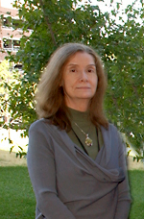
Dr. Katheleen Gardiner is a Professor in the Department of Pediatrics at the University of Colorado Denver and the Linda Crnic Institute for Down Syndrome. Dr. Gardiner received a B.S. degree in Honors Physics from McGill University in Montreal. She then spent 2 ½ years teaching high school general science and physics in Kanye, Botswana. She received a PhD from the Department of Biophysics and Genetics at the University of Colorado Health Sciences Center, for studies on RNA processing in bacteria, work which subsequently was awarded a Nobel Prize.
During a postdoctoral fellowship at the Eleanor Roosevelt Institute in Denver, Dr. Gardiner began working on Down syndrome, initially mapping genes on human chromosome 21 at the start of the human genome project. This work led to her chairing an international committee on genomic sequence annotation when the complete DNA sequence of human chromosome 21 was generated and published in 2000. Dr. Gardiner has continued to focus her research on human chromosome 21 and Down syndrome at the Eleanor Roosevelt Institute, then at the University of Denver. She moved to the University of Colorado in 2007 and joined the Crnic Institute for Down Syndrome in 2012. Current research focuses on protein expression in mouse and human model systems of Down syndrome, and combines wet bench experimental work with computational approaches. The goal is to identify critical patterns in gene expression that underlie learning and memory deficits and to manipulate these with drug treatments to rescue cognitive deficits.
Dr. Gardiner has organized that last two international conferences on Down syndrome and the biology of human chromosome 21 (in 2007 and 2004) in Washington DC, and co-organized similar conferences in 2000 and 1997, held at the Jackson Laboratory in Bar Harbor, and the Max Planck Institute in Berlin, respectively. She recently organized a conference entitled “Cognition in Down syndrome: molecular, cellular and behavioral phenotypes and the promise of pharmacotherapeutics.” It was held in Washington, DC, April 13-15, 2013.
Michael Yeager, Ph.D.

Michael Yeager is an Associate Professor in Pediatrics and Bioengineering at the University of Colorado. He earned his Ph.D. at CU in Experimental Pathology and completed post-doctoral fellowships at Johns Hopkins Medical Institutes and National Jewish Hospital. His primary research interests have focused on inflammation and fibrosis of the lung vasculature and the right ventricle in children and adults with pulmonary hypertension and idiopathic pulmonary fibrosis. Recently, he has been investigating why persons with Down syndrome are more susceptible to infectious lung disease. He is grateful to be funded to do this work by the Linda Crnic Institute for Down Syndrome, the American Heart Association, and the Jerome Lejeune Foundation.
Two Global Down Syndrome Foundation Experts Receive Prestigious National Awards for Scientific Breakthrough and Contributions in the Medical Field
July 23rd, 2018 by Global Down Syndrome Foundation
Dallas, TX – Dr. Joaquín Espinosa, Ph.D., Executive Director of the Linda Crnic Institute for Down Syndrome on the Anschutz Medical Campus (Crnic Institute), was awarded the National Down Syndrome Congress 2018 Pueschel-Tjossem Award for his scientific breakthrough recasting Down syndrome as an immune system disorder. Dr. Dennis McGuire, LCSW, Ph.D., Senior Consultant for Adult Medical Initiatives at the Global Down Syndrome Foundation (Global), received the 2018 Down Syndrome Medical Interest Group William I. Cohen MD, Distinguished Service Award for his lifetime work in behavioral and mental health for adolescents and adults with Down syndrome. He received the award along with his esteemed and accomplished colleague, Dr. Brian Chicoine, M.D.. Both awards were presented at the National Down Syndrome Congress (NDSC) Annual Convention.
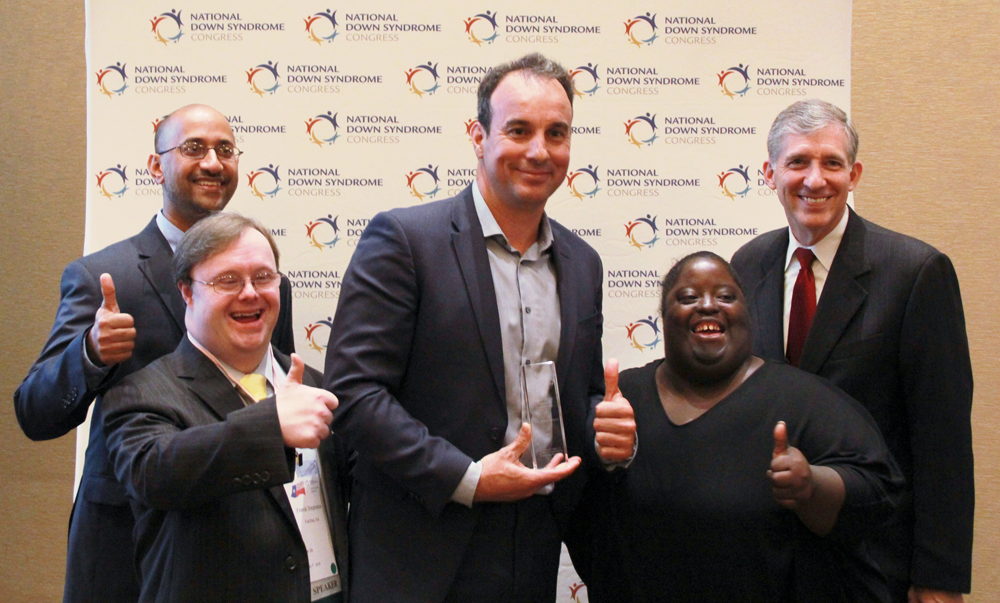 Kishore Vellody, M.D., Frank Stephens, Joaquín Espinosa, Ph.D.,DeOndra Dixon, and David Tolleson
Kishore Vellody, M.D., Frank Stephens, Joaquín Espinosa, Ph.D.,DeOndra Dixon, and David Tolleson
Dr. Espinosa is a nationally and internationally renowned cancer scientist. As the Executive Director of the Crnic Institute, a Global Affiliate, he oversees the Crnic Institute Human Trisome Project™, studying how Down syndrome (trisomy 21) connects to cancer, Alzheimer’s, immune system disorders, and multiple other co-morbidities. He is also a Professor in the Department of Pharmacology and founding Director of the Functional Genomics Facility at the University of Colorado Anschutz Medical Campus School of Medicine, and co-Leader of the Molecular Oncology program at the University of Colorado Cancer Center. The NDSC Pueschel-Tjossem Award recognizes research that has contributed to greater knowledge and understanding of Down syndrome and has improved the lives of people with Down syndrome and their families.
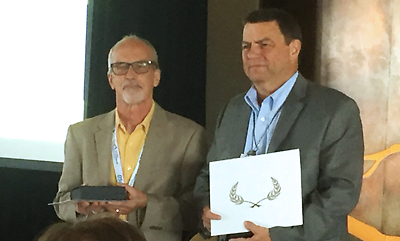 Dr. Dennis McGuire and Dr. Brian Chicoine
Dr. Dennis McGuire and Dr. Brian Chicoine
Dr. McGuire has more than 30 years of experience in the fields of mental health and developmental disabilities. He currently serves as Global’s Senior Consultant specializing in adult initiatives, including establishing a medical care center for adults with Down syndrome in Denver. Along with his colleague Dr. Chicoine, Dr. McGuire co-founded the Adult Down Syndrome Center of Lutheran General Hospital in Chicago, the largest, most prestigious clinic for adults with Down syndrome in the United States, where he served as Director of Psychological Services. Drs. McGuire and Chicoine co-authored two milestone books, Mental Wellness in Adults with Down Syndrome and The Guide to Good Health for Teens and Adults with Down Syndrome. Both doctors are serving as authors for Global’s Medical Care Guidelines for Adults with Down Syndrome – an important community service project.
The Down Syndrome Medical Interest Group-USA (DSMIG-USA) established the William I. Cohen, MD Distinguished Service Award in 2016 to honor a member for major contributions to DSMIG-USA’s mission of promoting the health and wellness of individuals with Down syndrome.
Colorado Public Radio interviews Global President & CEO on pivotal research that could improve lives
January 3rd, 2018 by Global Down Syndrome Foundation
Michelle Sie Whitten, who heads the Denver-based Global Down Syndrome Foundation, has big hopes for new research at the University of Colorado, where scientists say they have upended the conventional wisdom that Down syndrome is a brain disorder. Instead, they classify it as a malfunction of the immune system.
Crnic Institute study published in American Scientist Magazine
December 26th, 2017 by Global Down Syndrome Foundation
People with Down syndrome are the largest human population with a genetic predisposition to develop early-onset Alzheimer’s disease. By the time they reach age 40,100 percent of people with Down syndrome develop the brain pathology of amyloid plaques and neurofibrillary tangles that precede cognitive decline, and a fraction (4 percent to 55 percent) go on to develop dementia by age 59. If researchers could understand why, it could help both people with Down syndrome and those with Alzheimer’s disease.
Global Down Syndrome Foundation announces new collaboration for groundbreaking Down syndrome – Alzheimer’s disease research project
October 18th, 2017 by Global Down Syndrome Foundation
$2.5 million initial commitment to launch project
DENVER –The Global Down Syndrome Foundation today announced that Biogen, a neuroscience leader has joined the Global Down Syndrome Foundation and the University of Colorado School of Medicine in a groundbreaking project that explores the connection between Alzheimer’s disease and Down syndrome.
The Crnic Institute Human Trisome ProjectTM (HTP) is an ambitious longitudinal and cross-sectional study that will recruit 1,000 individuals with Down syndrome (also known as Trisomy 21) and 500 typical individuals. Scientists and clinicians will sequence and study several layers of genomics information (all de-identified) from a single sample of blood. Saliva, stool and other samples are also being collected. The Crnic Institute HTP has already begun to significantly increase the speed of Down syndrome research and has enrolled nearly 300 participants in the first 11 months.
“People with Down syndrome have a different disease spectrum,” said Dr. Joaquín Espinosa, executive director of the Crnic Institute, and the principal investigator of the Crnic Institute HTP. “The Crnic Institute HTP will allow us to redefine Down syndrome from the least scientifically understood condition to one of the best understood conditions. In addition, it will provide unprecedented understanding of Alzheimer’s disease, autoimmune conditions, cancers and other medical conditions that people with Down syndrome are either very predisposed to or protected from, eventually enabling the development of new diagnostic and therapeutic tools.”
“This research will serve first and foremost people with Down syndrome, but also the millions of individuals without Down syndrome who are affected by the many medical conditions modulated by trisomy 21,” said Espinosa.
Biogen has committed more than $500,000 and additional in-kind resources to the Crnic Institute HTP to investigate the genome and epigenome of specific cell types in the blood that could inform the development of Alzheimer’s disease. This initial investment is being financed with funds from Biogen and $1 million from the University of Colorado School of Medicine at the Anschutz Medical Campus – home to the Linda Crnic Institute for Down Syndrome – with a matching gift of $1 million from the Global Down Syndrome Foundation.
“Down syndrome is still one of the least funded genetic conditions of the federal government, so we are extremely grateful for the commitment from CU and Biogen,” said Michelle Sie Whitten, president & CEO of the Global Down Syndrome Foundation. “This is just the beginning as we hope to attract other biopharmaceutical organizations and philanthropists committed to improving the lives of people with Down syndrome and other conditions.”
“The School of Medicine provides a home for outstanding biomedical research that leads to improved care for all,” said Dr. John J. Reilly, Jr., vice chancellor for health affairs and dean of the University of Colorado School of Medicine. “We are confident that this investment will have a significant impact on our understanding of the health of people with Down syndrome and that it will lead to discoveries informing the care we provide.”
“Our son is 38 years old and we are concerned that he may get Alzheimer’s,” said Jack and Penni Dorwart, whose son participated in the Crnic Institute HTP. “We also know that if we have high- quality research that there is the potential to significantly improve not only our son’s life but millions of others with Down syndrome who have many other medical issues that prevent good quality of life. That is why we participated in this study and we encourage others to do the same. We are grateful to the Crnic Institute and the Global Down Syndrome Foundation for taking on this difficult work and advocating for our children and adults.”
Learn more about in the Crnic Institute Human Trisome ProjectTM or sign up to participate in the study.


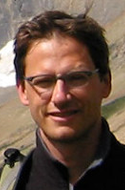


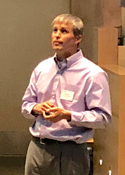
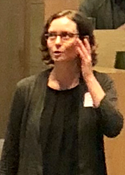
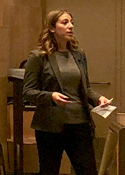
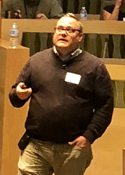
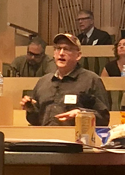


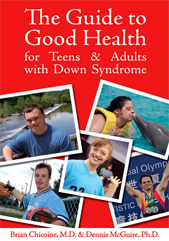
 Experience our inspirational and groundbreaking videos and photos. Our children and self-advocates are beautiful AND brilliant!
Experience our inspirational and groundbreaking videos and photos. Our children and self-advocates are beautiful AND brilliant! Make sure your local Representatives are on the Congressional Down Syndrome Task Force.
Make sure your local Representatives are on the Congressional Down Syndrome Task Force.